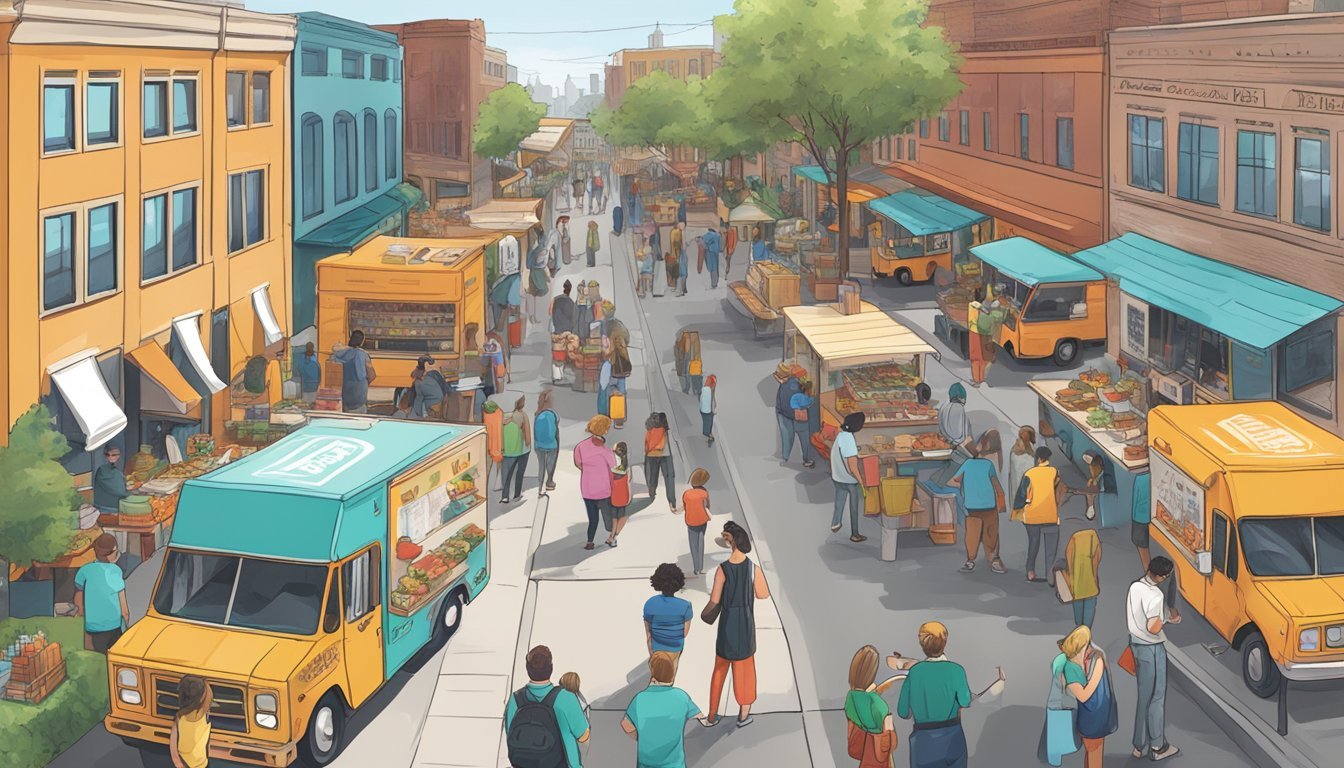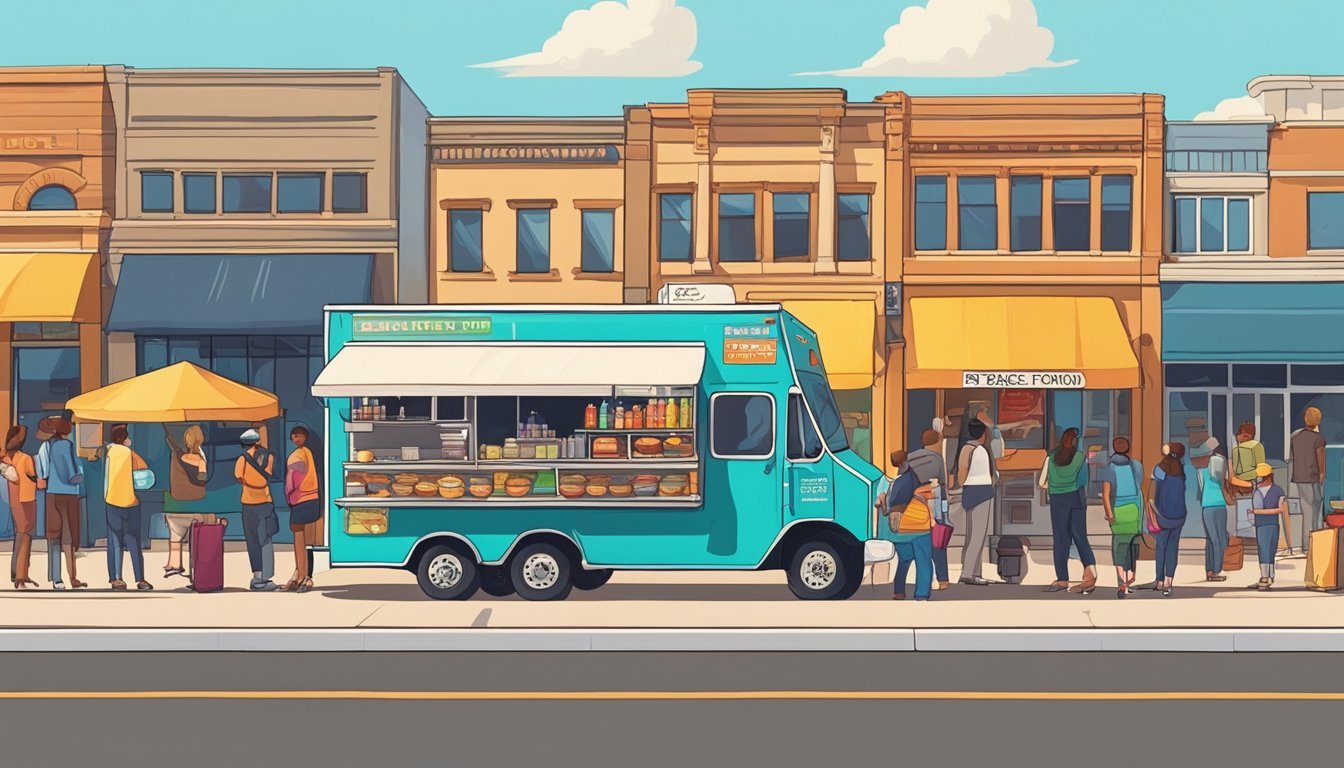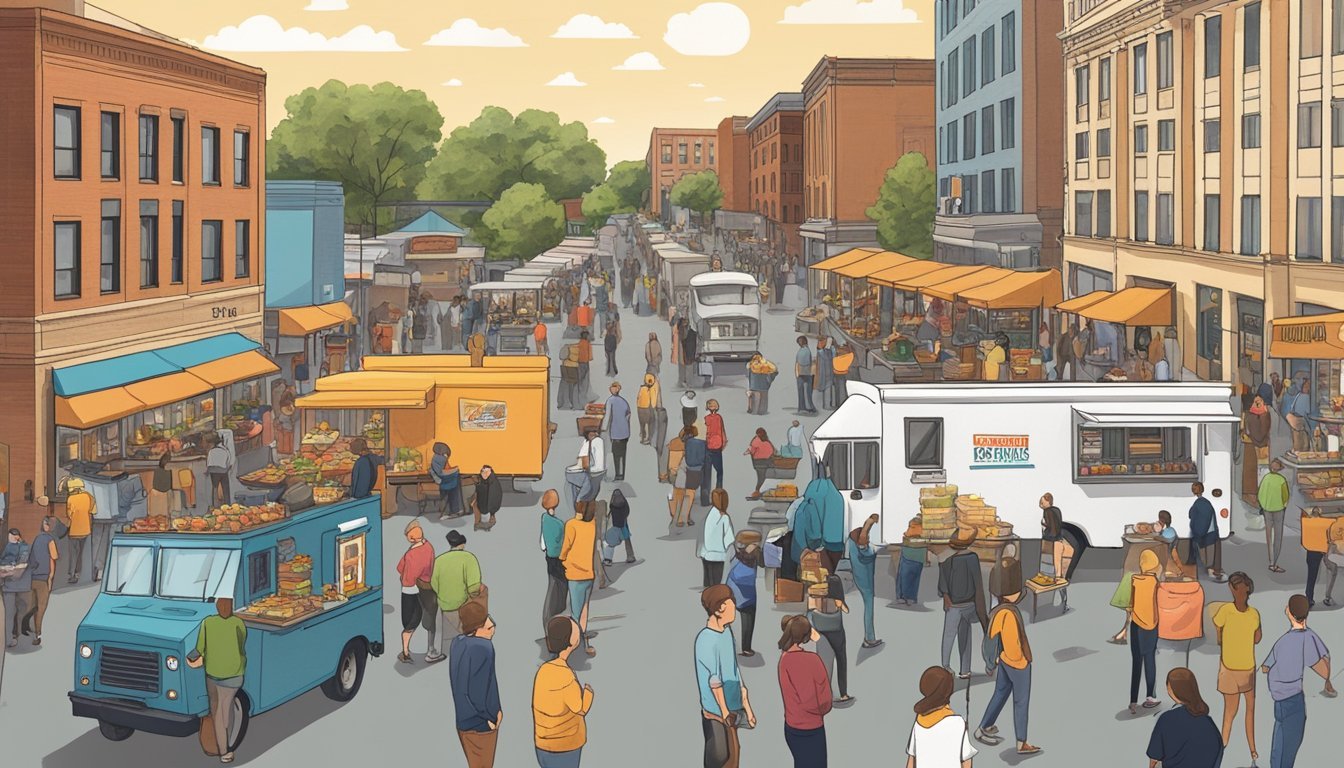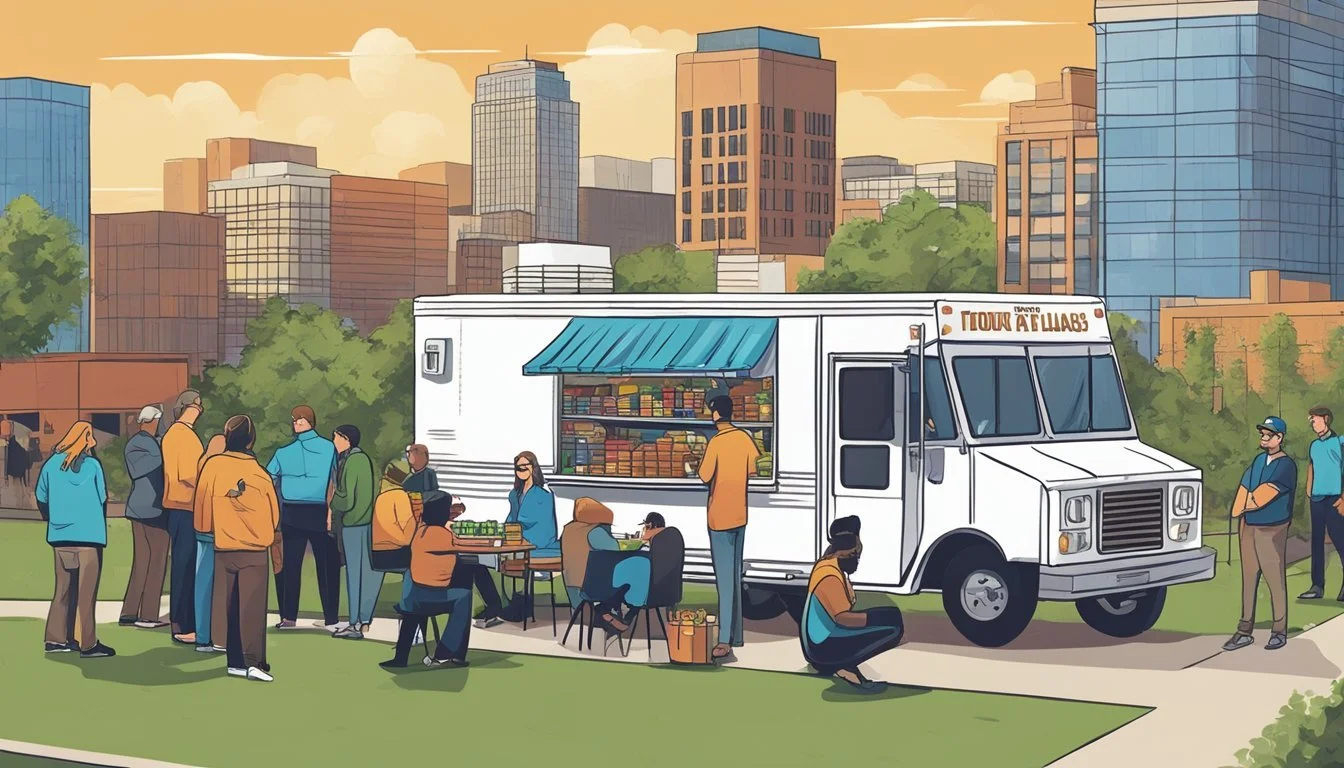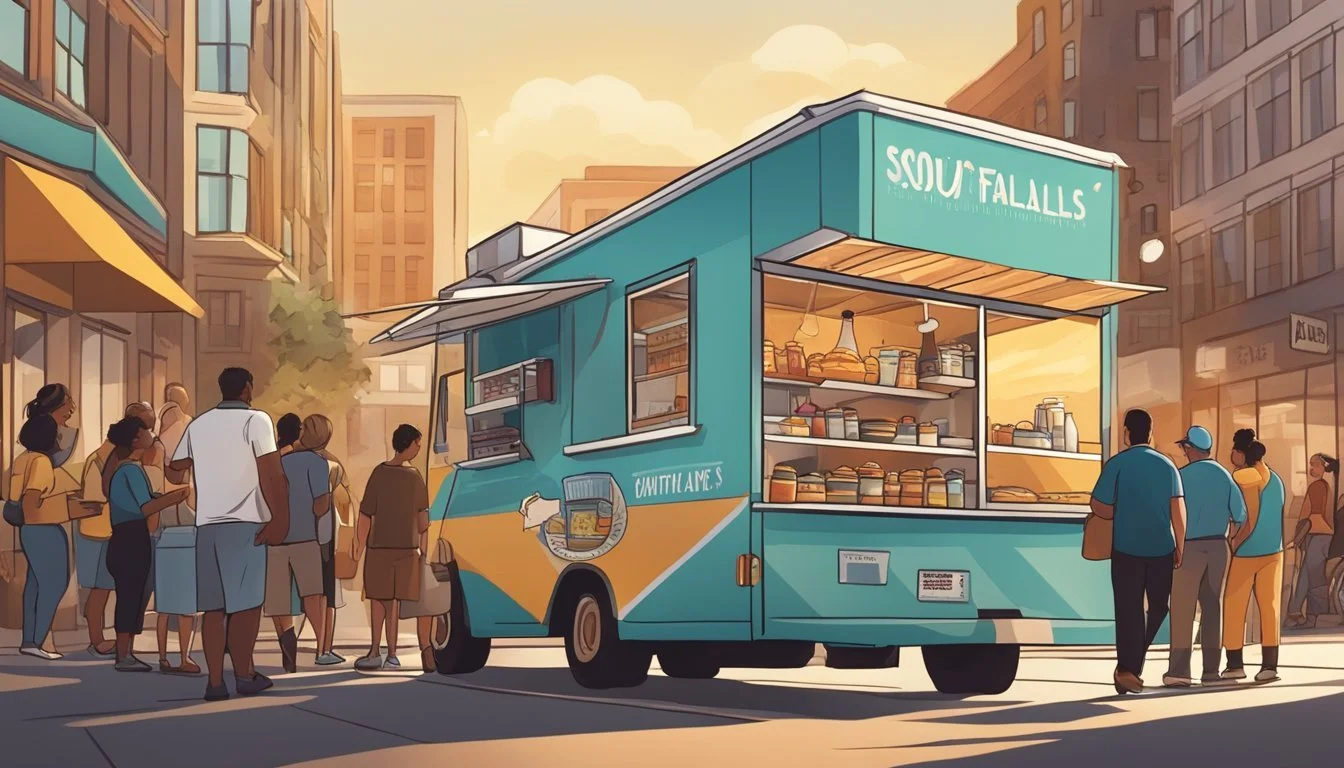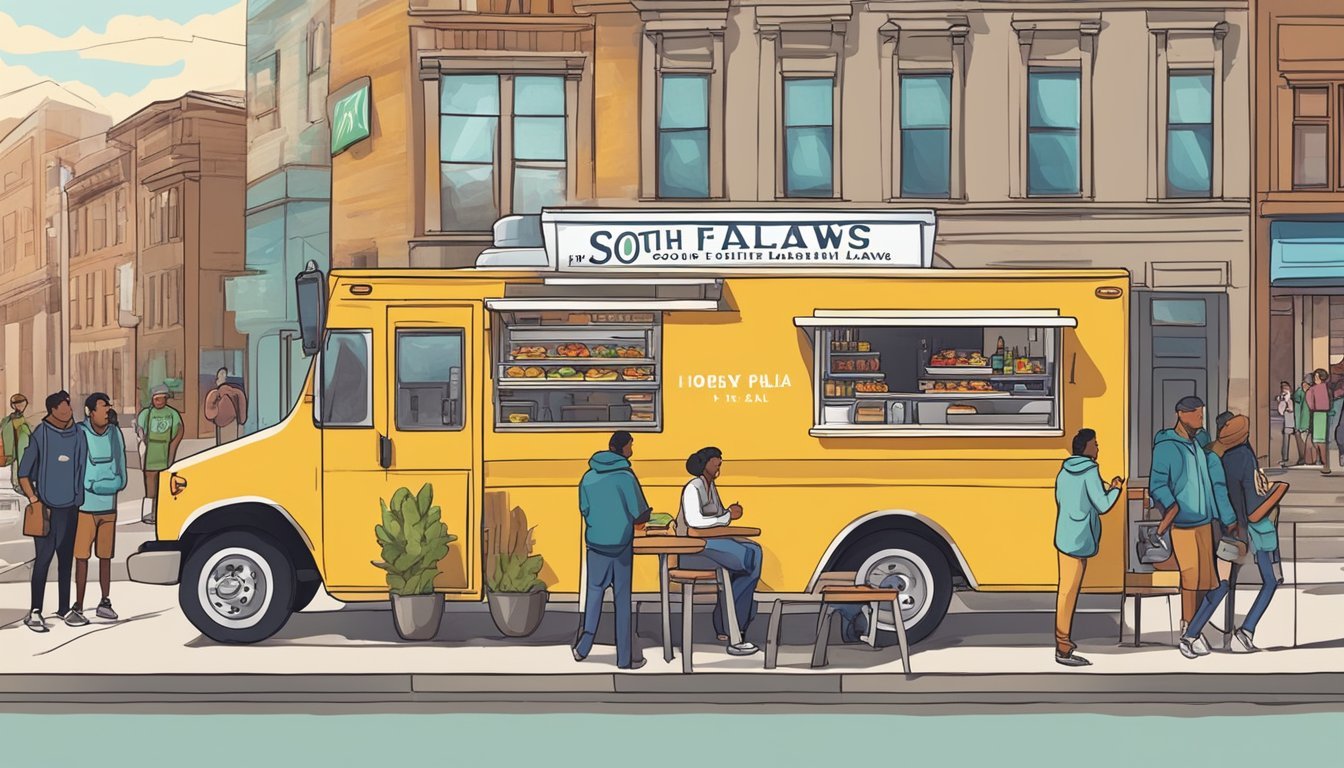Food Truck Laws Sioux Falls, South Dakota
Regulations for Mobile Vendors
Food truck businesses in Sioux Falls, South Dakota, are subject to specific regulations designed to ensure food safety and fair commerce. A potential food truck operator must navigate a series of guidelines, from safe food handling requirements to obtaining necessary permits and licenses. In Sioux Falls, food trucks, just like any other food service establishment, are mandated to ensure that no foods are prepared in a private home and dispensed from the mobile unit – a common rule to certify the safety and hygiene of the food being served.
Moreover, operators are required to have their food items stored and handled at appropriate temperatures, with stringent rules such as keeping potentially hazardous foods cold below 41° F or held hot above 140° F. Key to beginning a food truck venture is the acquisition of a South Dakota State sales tax number, which is a prerequisite that will be verified during the application process. Interested entrepreneurs are encouraged to contact the designated authorities for the procedural details and to ensure compliance with all the regulatory requirements specific to Sioux Falls. The mobile food distribution program also aims to reach communities in need, enhancing access to nutritious food options across the region.
Overview of Sioux Falls Food Truck Regulations
In Sioux Falls, South Dakota, food trucks are subject to a comprehensive set of regulations designed to ensure public health and safety while fostering a vibrant mobile culinary scene.
Permitting Process and Licensing Requirements
To operate in Sioux Falls, food trucks must secure various permissions, including a license from the Department of Health. The application process requires details like a Sales Tax Number, layout plans of the service areas, and a Food Service License. Obtaining an EIN (Employer Identification Number) is also necessary for legal and tax purposes.
Operating Locations and Restrictions
Food trucks are allowed in designated areas, such as parks and downtown Sioux Falls, but must adhere to specific traffic patterns and restrictions. The City of Sioux Falls dictates where and when food trucks can operate, preventing conflict with brick-and-mortar businesses.
Legislative Framework
Local governments and municipalities, including Sioux Falls, are governed by legislation like Senate Bill 107, introduced by South Dakota Senator Al Novstrup. This bill impacts how food trucks operate within city bounds, including issues of competition and location.
Health and Safety Standards
The Department of Health mandates food trucks meet strict health codes, enforced through ServSafe or equivalent programs. Adherence to these health and safety standards is crucial for food service establishments to maintain their licenses.
Business Operations and Competition
Sioux Falls food trucks must navigate competition not only amongst themselves but also with static restaurants. The operating landscape is regulated to ensure fair business practices and to prevent market saturation.
Privacy and Oversight
GPS tracking and online presence of food trucks might stir concerns about privacy, but Sioux Falls regulations also protect personal data. Oversight ensures that while businesses can be located conveniently via technology, there is no invasion of privacy.
Seasonal Operation Considerations
Operating primarily in the summer months, Sioux Falls food trucks adapt to seasonal variations. They plan menus and stock ingredients accordingly, often offering seasonal favorites like tacos and burgers to entice customers.
Menu Planning and Food Offerings
Food trucks in Sioux Falls bring diversity to the culinary scene with menus spanning from classic American fare to ethnic delicacies. Menu planning is key, with trucks offering a variety of ingredients to cater to varied tastes and dietary needs.
Starting a Food Truck Business
Starting a food truck business in Sioux Falls requires thorough market research, compliance with regulations, smart financial planning, an effective marketing strategy, and careful design of the truck itself. Below are specific steps and considerations for aspiring food truck entrepreneurs in Sioux Falls.
Market Research and Concept Development
Before launching a food truck, it's essential to understand the Sioux Falls market and identify a target audience. Researching popular local tastes and potential gaps in the food market can inform a compelling menu concept. Developing a unique selling proposition that stands out in the competitive landscape is crucial for success.
Business Registration and Compliance
To operate legally in Sioux Falls, food trucks must obtain an Employer Identification Number (EIN) and a sales tax number. The license application process involves ensuring compliance with local health and safety regulations. It's important to acquire all necessary permits and stay informed about local businesses regulations to avoid any legal hurdles.
Financial Planning and Budgeting
Careful budgeting is key to managing the costs associated with starting and running a food truck. This includes the investment in the vehicle, equipment, initial inventory, and ongoing expenses. A clear financial plan helps secure funding, whether it be through loans or other financing options, and ensures the sustainability of the business.
Marketing and Online Presence
A strong online presence and social media strategy are imperative for modern businesses, including food trucks. Creating a cohesive branding strategy that translates across both digital and physical assets helps build recognition. Regular engagement on platforms like Facebook and Instagram keeps the target audience informed and interested.
Food Truck Design and Vehicle Considerations
The layout plans and design of the truck should support an efficient workflow and conform to Sioux Falls' regulations. Vehicle considerations such as size, kitchen equipment, and maintenance must align with business needs and budget constraints. The truck's aesthetic should reflect the brand and appeal to the target market, ensuring functionality does not compromise style.
Community and Economic Impact
In Sioux Falls, the presence of food trucks has become a dynamic feature of the local economy, influencing businesses and the flow of traffic, particularly in the downtown area.
Relationship with Local Restaurants and Retailers
Food trucks in Sioux Falls enter into a complex relationship with stationary businesses. While they add diversity to the local cuisine, they also stir concerns among restaurant owners regarding competition. The downtown area sees a blend of these mobile eateries and traditional restaurants, with food trucks often serving as a driver for increased pedestrian traffic. This synergistic effect can benefit brick-and-mortar establishments by drawing more visitors to the vicinity, potentially boosting sales for nearby retailers as well.
In navigating the relationship with local restaurants and retailers, food trucks must work within the regulations set forward by municipal laws, such as permitted locations and operating hours, to ensure a balance between the new mobile business model and existing businesses. The regulations are designed to manage the traffic patterns effectively, preventing congestion and ensuring pedestrian safety. They are also structured to provide opportunities for food trucks to thrive without overshadowing the long-established eateries and shops.
The community's reception of food trucks is largely positive, as they are a source of innovation in the food scene and contribute to the lively ambiance of Sioux Falls, especially during events and warmer months. The economic benefits extend beyond individual food trucks, as they often participate in local events, fostering a sense of community and supporting the city's image as a vibrant place to live and visit.
Key Stakeholders and Advocacy Groups
Successful food truck operations in Sioux Falls depend on a collaborative ecosystem consisting of food truck owners, local government bodies, business associations, and the community they serve. These entities work together to shape the food truck scene in a way that balances entrepreneurial freedom with urban planning and community interests.
Voices of the Food Truck Community
In Sioux Falls, food truck owners like those operating Redders Food Truck, Boki Gelato, and Breaking Burrito represent the entrepreneurial spirit of the local food truck community. They advocate for favorable legislation that allows their mobile culinary businesses to thrive while meeting the needs of a diverse clientele.
Local Government and Regulatory Bodies
The City of Sioux Falls and other local municipalities serve as regulatory entities ensuring that food trucks operate in compliance with municipal codes and safety standards. They are responsible for the enactment and enforcement of legislation that affects where and how food trucks can conduct their business in urban spaces.
Business Associations and Support Networks
Downtown Sioux Falls Inc., under the leadership of Joe Batcheller, president, plays a significant role in supporting the food truck ecosystem. It functions as both an advocate for business interests and a mediator, ensuring local regulations align with the growth of the food truck industry.
Public and Municipal Feedback
Feedback from the residents of Sioux Falls, including reports published by Argus Leader, is instrumental in shaping public policy. Community feedback serves as a barometer for the popularity and acceptance of food trucks in the social fabric of Sioux Falls and helps inform the governance and development of public spaces where food trucks operate.
Case Studies and Success Stories
The food truck scene in Sioux Falls has burgeoned, marked by a landscape of varied cuisines and unique dining experiences. Specific success stories epitomize the city’s thriving street food culture.
Established Sioux Falls Food Truck Businesses
Brosia Bowl stands out for its healthy and vibrant bowls, capturing the essence of nutritious fast food. Their commitment to fresh ingredients has garnered a loyal following.
Buffalo Gal Concessions is noted for its specialized American fare. This truck has found a niche in comfort food, bringing classics to the streets of Sioux Falls.
Curbside Delights brings a sweet twist to the mobile food industry, delighting customers with desserts that turn a casual treat into an unforgettable experience.
The story of Fat Kid Filly's is a study in perseverance. Launched amid the pandemic, this truck overcame odds by providing curbside to-go service and is now a local favorite for Philly cheesesteaks.
KK & Sons Lao & Thai Food (What wine goes well with Thai food?) delves into Asian cuisine, broadening Sioux Falls' palate with authentic flavors from Laos and Thailand.
La Fondita serves up Mexican staples, from tacos to tortas, with an authenticity that creates a mobile fiesta of flavors on Sioux Falls streets.
The food truck Let Me Be Frank is an embodiment of culinary creativity, offering an ever-evolving menu that tantalizes taste buds and sparks curiosity with its innovative dishes.
Potential Challenges and Risks
Operating a food truck in Sioux Falls involves navigating various challenges and risks that can impact the success of such mobile eateries. These range from adherence to local laws to the dynamics of the competitive landscape.
Compliance with Local Ordinances
Food trucks in Sioux Falls must adhere to specific local ordinances that dictate where and how they can operate. These regulations, designed to ensure public safety and fair business practices, can include limitations on the proximity to brick and mortar restaurants, permitted zones for operation, and hours of business. Non-compliance could lead to penalties, impeding the food truck's ability to operate within the city.
Navigating Bureaucratic Processes
Dealing with bureaucracy is a significant hurdle Sioux Falls food truck operators face. The process of obtaining licenses, permits, and passing health inspections is governed by local government procedures. This often involves interacting with different committees and departments, each with its own set of requirements. The complexity of legislation can sometimes result in delays, which may affect the timely launch or continued operation of food trucks.
Competition and Market Saturation
The food truck industry in Sioux Falls is not without its competition. As food trucks become more popular, the risk of market saturation increases, with numerous trucks vying for limited space and customers. This competition is heightened by the presence of established brick and mortar businesses that have already secured a loyal customer base. Food truck owners must therefore be strategic in differentiating their offerings and finding niche markets to ensure sustainability.
Conclusion
In Sioux Falls, the regulatory landscape for food trucks has evolved with an eye toward simplification. Legislative measures, such as Senate Bill 107, signify a commitment to reducing regulatory burdens and fostering a business-friendly environment. The bill's objective to streamline licensing across municipalities could aid in diminishing the logistical hurdles that food truck operators face.
Sioux Falls mandates operators to secure a peddler/mobile food license and uphold compliance with local health and safety standards. It is imperative for food truck entrepreneurs to obtain a South Dakota State sales tax number, a pre-requisite corroborated during the application process.
Summer welcomes an influx of food trucks, reflecting the seasonal dynamism of this industry.
Authorities consistently underscore the necessity of licensing to ensure compliance and public safety.
Operating a food truck in Sioux Falls demands diligence in legal and procedural adherence. Potential operators must deliberate over various aspects, from building a business plan, through securing permits, to the practicalities of outfitting a vehicle for food service.
For assistance and inquiries, Sioux Falls provides resources through their business permits division, ensuring clarity and support for mobile food vendors. The city's framework for food trucks exemplifies a balance between entrepreneurial freedom and the well-being of the public.


